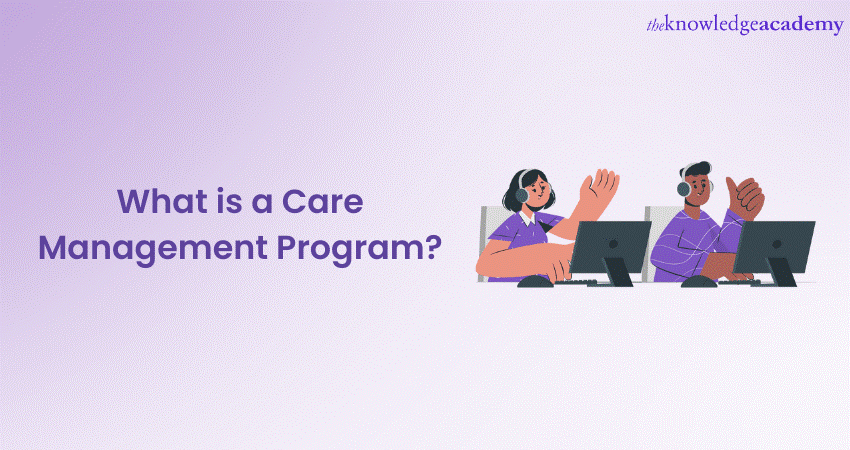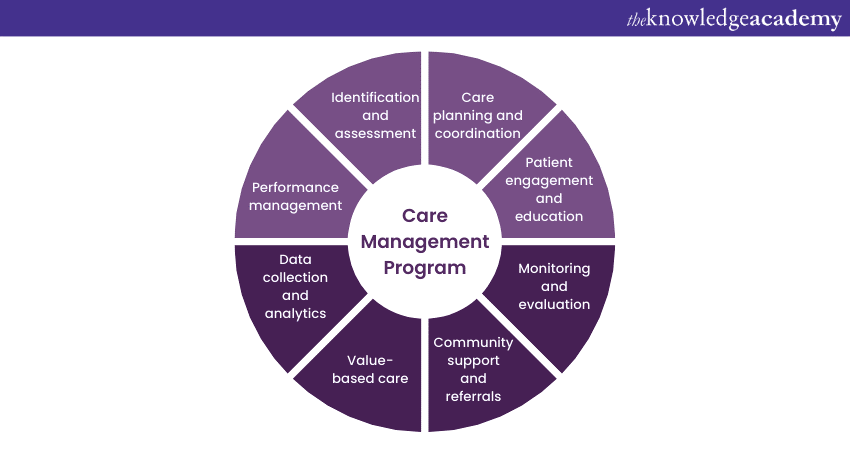We may not have the course you’re looking for. If you enquire or give us a call on 01344203999 and speak to our training experts, we may still be able to help with your training requirements.
Training Outcomes Within Your Budget!
We ensure quality, budget-alignment, and timely delivery by our expert instructors.

Care Management is a comprehensive approach that addresses the complex healthcare needs of individuals, aiming to improve the quality of care, enhance health outcomes, and optimise resource utilisation. It provides a framework that supports individuals in navigating the healthcare system, coordinating their care, and achieving their healthcare goals. But What is a Care Management Program? Read this blog further to learn about it.
Patients often face fragmented care, a lack of coordination among healthcare providers, and challenges in managing chronic conditions effectively. It can result in compromised health outcomes, increased healthcare costs, and a diminished patient experience. In this blog, we will understand What is Care Management Program, its framework and its benefits.
Table of Contents
1) What is a Care Management Program?
2) Framework of Care Management Program
a) Identification and assessment
b) Care planning and coordination
c) Patient engagement and education
d) Monitoring and evaluation
e) Community support and referrals
f) Value-based care
g) Data collection and analytics
h) Performance Measurement
3) Benefits of Care management
4) Conclusion
What is Care Management Program?
A Care Management Program is a proactive approach to healthcare that involves coordinating, organising, and supervising healthcare services for individuals with complex medical needs. It is an integrated system that brings together various healthcare providers, caregivers, and patients to ensure that the right care is delivered at the right time and efficiently.
At its core, a Care Management Program focuses on managing and improving the health of a defined population by addressing individual needs, promoting self-care, and preventing unnecessary hospitalisations or emergency room visits. It goes beyond traditional medical interventions by incorporating a multidisciplinary approach that considers social, emotional, and environmental factors that may impact an individual's well-being.
Become a Program Management Professional and advance your career in Program Management with our Program Management Professional (PgMP)® training.
Framework of Care Management Program

A Care Management Program operates within a structured framework encompassing several key components.
Identification and assessment
The first step in a Care Management Program is identifying individuals benefitting from effective care services. This can be done through various methods, including risk stratification tools, medical records analysis, referrals from healthcare providers, or self-referral.
Once identified, a comprehensive assessment is conducted to gather relevant information about the individual's medical history, current health status, social determinants of health, support systems, and personal goals. This assessment helps understand the individual's unique needs and create a tailored care plan.
Care planning and coordination
A personalised Care Plan is developed in collaboration with the individual, healthcare providers, and caregivers, outlining goals and interventions. Care coordination ensures effective communication and collaboration among healthcare professionals involved in the individual's care.
Patient engagement and education
Active patient engagement is encouraged, providing education and support for disease management, medication adherence, lifestyle changes, and preventive measures.
Monitoring and evaluation
Continuous monitoring of health status, progress towards goals, and adherence to the Care Plan enables timely adjustments. Monitoring may involve collecting data through various methods such as telemonitoring, electronic health records, or regular check-ins with the Care Management team.
Evaluations help identify gaps or modifications needed in the Care Plan, allowing for timely adjustments and improvements. This ongoing feedback loop ensures that the plan remains relevant and effective in addressing the individual's evolving needs.
Get certified in project management with this PMI Project Management Ready training and learn to implement the business analysis frameworks.
Community support and referrals
Care Management Programs often provide additional support services to individuals. These may include care coordination, counselling, health coaching, assistance with navigating the healthcare system, financial assistance programs, and referrals to community resources such as social services, support groups, or rehabilitation programs. The program addresses the medical aspects of care and the social, emotional, and environmental factors that may impact an individual's well-being.
Value-based care
Care Management Programs prioritise value-based care, which involves delivering high-quality care that improves health outcomes, enhances patient satisfaction, and effectively manages healthcare costs. Value-based care focuses on the overall value provided to patients, emphasising outcomes rather than simply the volume of services delivered.
Data collection and analytics
Care Management Programs leverage data collection and analytics to track patient health outcomes, identify trends, and measure program effectiveness. This data-driven approach supports evidence-based decision-making and program refinement.
Performance Measurement
Performance measurement holds significant importance in Care Management Programs as it allows for the assessment of program effectiveness and efficiency. The performance of the care team and the patient’s health is measured and tracked to find ways for improvement.

Benefits of Care Management Program
Implementing a Care Management Program offers numerous advantages for individuals, healthcare providers, and the healthcare system. The program's focus on improving the quality of care, enhancing health outcomes, and optimising resource utilisation yields several key benefits.
a) Improved health outcomes: The program provides personalised care, disease management, and preventive measures, leading to better health outcomes, reduced complications, and improved well-being.
b) Enhanced patient satisfaction: Patient-centered care, shared decision-making, and tailored support increase patient satisfaction and engagement in their care.
c) Increased care coordination: Effective care coordination among providers reduces fragmented care, improves continuity, and enhances transitions, leading to better adherence and fewer medical errors.
d) Optimal resource utilisation: Proactive monitoring and interventions minimise unnecessary healthcare utilisation, reducing costs and optimising resource allocation.
e) Cost savings: By preventing complications, readmissions, duplicate tests and unnecessary services, the program generates cost savings in the long term.
f) Population health improvement: Targeting high-risk individuals and addressing their health needs promotes healthier communities and reduces disparities.
Conclusion
Now that you understand “What is a Care Management Program”, you are now aware that, it improves care quality, enhances health outcomes, and optimises resource utilisation. It achieves personalised care, fosters coordination, and empowers patients. By prioritising value-based care, these programs deliver high-quality care, improve satisfaction, and generate cost savings. Ultimately, Care Management contributes to better health, efficient resource allocation, and overall well-being.
Become a certified Project Manager and learn how to manage programs with our extensive PMP® Training courses.
Frequently Asked Questions
Upcoming Project Management Resources Batches & Dates
Date
 PMP® Certification Training Course
PMP® Certification Training Course
Sat 18th May 2024, Sun 19th May 2024
Mon 20th May 2024
Tue 28th May 2024
Mon 3rd Jun 2024
Mon 10th Jun 2024
Sat 15th Jun 2024, Sun 16th Jun 2024
Mon 17th Jun 2024
Mon 24th Jun 2024
Sat 29th Jun 2024, Sun 30th Jun 2024
Mon 1st Jul 2024
Mon 8th Jul 2024
Sat 13th Jul 2024, Sun 14th Jul 2024
Mon 15th Jul 2024
Mon 22nd Jul 2024
Sat 27th Jul 2024, Sun 28th Jul 2024
Mon 29th Jul 2024
Mon 5th Aug 2024
Sat 10th Aug 2024, Sun 11th Aug 2024
Mon 12th Aug 2024
Mon 19th Aug 2024
Sat 24th Aug 2024, Sun 25th Aug 2024
Tue 27th Aug 2024
Mon 2nd Sep 2024
Sat 7th Sep 2024, Sun 8th Sep 2024
Mon 9th Sep 2024
Mon 16th Sep 2024
Sat 21st Sep 2024, Sun 22nd Sep 2024
Mon 23rd Sep 2024
Mon 30th Sep 2024
Sat 5th Oct 2024, Sun 6th Oct 2024
Mon 7th Oct 2024
Mon 14th Oct 2024
Sat 19th Oct 2024, Sun 20th Oct 2024
Mon 21st Oct 2024
Mon 28th Oct 2024
Sat 2nd Nov 2024, Sun 3rd Nov 2024
Mon 4th Nov 2024
Mon 11th Nov 2024
Sat 16th Nov 2024, Sun 17th Nov 2024
Mon 18th Nov 2024
Mon 25th Nov 2024
Sat 30th Nov 2024, Sun 1st Dec 2024
Mon 2nd Dec 2024
Mon 9th Dec 2024
Sat 14th Dec 2024, Sun 15th Dec 2024
Mon 16th Dec 2024
Mon 6th Jan 2025
Mon 13th Jan 2025
Mon 20th Jan 2025
Mon 27th Jan 2025
Mon 3rd Feb 2025
Mon 10th Feb 2025
Mon 17th Feb 2025
Mon 24th Feb 2025
Mon 3rd Mar 2025
Mon 10th Mar 2025
Mon 17th Mar 2025
Mon 24th Mar 2025
Mon 31st Mar 2025
Mon 7th Apr 2025
Mon 14th Apr 2025
Tue 22nd Apr 2025
Mon 28th Apr 2025
Tue 6th May 2025
Mon 12th May 2025
Mon 19th May 2025
Tue 27th May 2025
Mon 2nd Jun 2025
Mon 9th Jun 2025
Mon 16th Jun 2025
Mon 23rd Jun 2025
Mon 30th Jun 2025
Mon 7th Jul 2025
Mon 14th Jul 2025
Mon 21st Jul 2025
Mon 28th Jul 2025
Mon 4th Aug 2025
Mon 11th Aug 2025
Mon 18th Aug 2025
Tue 26th Aug 2025
Mon 1st Sep 2025
Mon 8th Sep 2025
Mon 15th Sep 2025
Mon 22nd Sep 2025
Mon 29th Sep 2025
Mon 6th Oct 2025
Mon 13th Oct 2025
Mon 20th Oct 2025
Mon 27th Oct 2025
Mon 3rd Nov 2025
Mon 10th Nov 2025
Mon 17th Nov 2025
Mon 24th Nov 2025
Mon 1st Dec 2025
Mon 8th Dec 2025
Mon 15th Dec 2025







 Top Rated Course
Top Rated Course


 If you wish to make any changes to your course, please
If you wish to make any changes to your course, please


